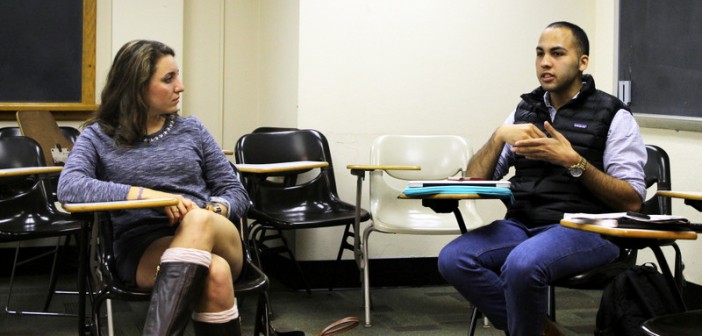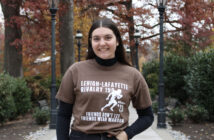Unite. Build. Develop. Configure. Shine.
These are just some of the words that come to mind when thinking of Lehigh’s Student Senate.
Student Senate has two purposes. Its main objective, according to President Kerry Mallett, “is to be the voice of the student body.” Secondly, it looks to improve the university as a whole.
The senate has two main committees — the Standing and Campus Life Improvement Project committees. The Standing Committee consists of allocations, club affairs and public relations committees. Allocations determines the budgets for clubs for the next year and approves funding requests that clubs may have throughout the year.
“Basically, any funding that a club seeks to get through Senate goes through the allocations committee,” said Anna D’Ginto, ’16, Senate’s vice president.
The senate’s personal budget goes to the process and betterment of the organization itself. Money goes toward the funding for fall and spring retreats that bring the senate closer together. Clubs’ funding are not a part of their budget; instead, the senate divide the money the university provides among different clubs.
Club affairs approves groups that want to be recognized by the university and works with existing clubs to make sure that they are fulfilling expectations. Each group seeking to become a club goes through a 15-week trial process so it can show the senate what it is capable of becoming.
Public relations advertises about anything Senate-related around campus, whether that means events, meetings or notices to inform students about open spots within Student Senate.
The CLIP Committee’s focus topics change every year. Its current discussion topics are safety; diversity inclusion; community relations; student engagement and unity; and facilities, transportation and technology. Each year, discussion topics for the academic year are decided during the previous summer months with help from surveys sent out to students.
By looking at the survey from this past summer, as well as by talking to and working with different students and organizations, the senate realized it needed to focus on safety and diversity inclusion. The group is looking to fix any issues surrounding those topics this semester.
“They are really big, not only hot topics right now, but areas that Lehigh has a critical need for,” Mallett said.
To have the student body expand its diversity horizons, the senate is meeting with administrators to see if they can add something to the Lehigh curriculum: a diversity requirement. Students would have the ability to pick a course that would spark their interest and include subject matters that would enlighten students about diversity subjects, issues and controversies.
Last semester, senators noticed how controversial topics rose on the social media app Yik Yak and decided they needed to address the issue. The senators sat down together to determine how they should address the app for the betterment of the university. Was banning the app and not letting students’ voices better or worse? As leaders, they all decided that it would be best if they didn’t fully to ban the app from the university, rather just not condone the use of it within student senate, explained Student Senate Secretary Stephanie Piscopo, ’16.
Getting involved in Student Senate is not necessarily an easy task. The previous senate elects the executive board, meaning those chosen don’t have to run for the next year. All others, however, have to run every year to keep their seats.
All seats on the senate are determined by where students live. This process, known as “general election,” occurs every spring semester in April. The senate is allowed to publish the seats that are open during the first two weeks of the school year. First-year students are elected in the fall during a normal election process.
The full 50-student senate meets every other week on Tuesdays at 4 p.m. Every senator is on two committees, one standing and one CLIP, which meet weekly. Being a general member of the student senate requires attendance at two to three meetings each week. Admin meetings, meaning those on the senate chairs, meet on the Tuesdays that full senate doesn’t meet.
Mallett not only tries to attend every meeting possible, but also holds office hours for senators to discuss ongoing projects and express concerns about campus or senate initiatives.






Comment policy
Comments posted to The Brown and White website are reviewed by a moderator before being approved. Incendiary speech or harassing language, including comments targeted at individuals, may be deemed unacceptable and not published. Spam and other soliciting will also be declined.
The Brown and White also reserves the right to not publish entirely anonymous comments.